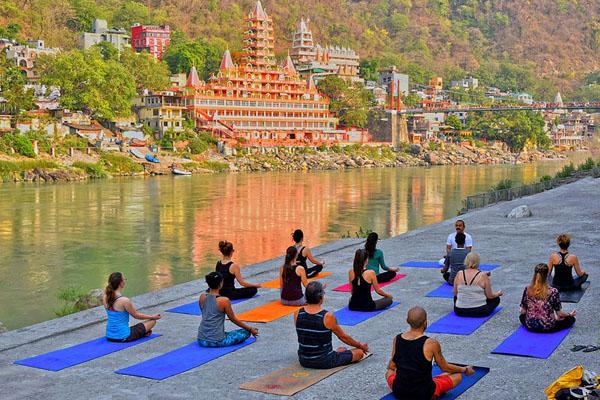Embarking on a 200 Hour Yoga Teacher Training Course (TTC) in Rishikesh is more than just learning yoga poses—it’s a journey toward self-discovery, inner peace, and holistic well-being. Known as the “Yoga Capital of the World,” Rishikesh is the ultimate destination for aspiring yoga teachers and enthusiasts seeking authentic yogic wisdom. Whether you want to deepen your personal practice or begin a professional teaching career, a 200 Hour yoga TTC in Rishikesh offers countless physical, mental, and spiritual benefits.
1. Foundation for Your Yoga Journey
The 200 Hour yoga TTC is the foundational step in yoga education. It is carefully structured to introduce you to the essential principles of yoga, including asanas (postures), pranayama (breathing techniques), meditation, anatomy, philosophy, and teaching methodology. This comprehensive curriculum ensures that you gain a deep understanding of yoga’s physical and philosophical aspects.
In Rishikesh, this training is guided by experienced Indian yoga masters who uphold the ancient traditions of yoga as passed down through generations. Students not only learn how to perform yoga poses correctly but also understand their impact on the body, mind, and energy systems.
2. Authentic Learning Environment
Rishikesh’s serene atmosphere and spiritual energy make it the perfect place for yoga training. Nestled in the foothills of the Himalayas and blessed by the sacred Ganges River, Rishikesh provides a peaceful and natural setting that enhances concentration, mindfulness, and inner awareness.
Unlike commercial yoga studios found elsewhere, yoga schools in Rishikesh emphasize authenticity. They follow the ancient Gurukul tradition, where students live, learn, and practice under the guidance of their teachers. This immersive experience allows participants to disconnect from the distractions of modern life and fully absorb the essence of yoga.
3. Comprehensive Curriculum and Traditional Teachings
One of the main benefits of pursuing a 200 Hour yoga TTC in Rishikesh is the comprehensive and traditional curriculum. The course covers multiple branches of yoga, including:
Hatha Yoga: Focuses on physical postures, alignment, and strength.
Ashtanga Yoga: Involves a dynamic and structured sequence of poses.
Pranayama: Teaches various breathing techniques to balance energy.
Meditation: Enhances mindfulness and inner calm.
Yoga Philosophy: Introduces the Yoga Sutras of Patanjali and the Bhagavad Gita.
Anatomy & Physiology: Helps understand the human body and its relation to yoga practice.
Teaching Methodology: Develops confidence and skills to lead yoga classes effectively.
By the end of the course, students not only perfect their asanas but also grasp the spiritual depth behind yoga practice.
4. Physical Health and Flexibility
Daily yoga practice during the TTC enhances strength, flexibility, and balance. The combination of asanas and pranayama improves blood circulation, boosts immunity, and supports better posture. Over time, students notice increased stamina, reduced body stiffness, and overall physical transformation.
Moreover, the structured schedule—often beginning with early morning practice and ending with evening meditation—promotes discipline and a healthy lifestyle.
5. Mental Clarity and Emotional Balance
Yoga is not limited to the physical body—it equally nurtures the mind. A 200 Hour yoga TTC in Rishikesh integrates meditation, mindfulness, and pranayama, which collectively help reduce anxiety, stress, and overthinking. Through daily practice and self-reflection, students cultivate inner peace and emotional stability.
The calm environment of Rishikesh, combined with guided meditations by experienced gurus, helps practitioners develop awareness and mental clarity. As a result, they become more centered, focused, and resilient in facing life’s challenges.
6. Spiritual Growth and Self-Discovery
Rishikesh is not just a city; it’s a spiritual hub where seekers from around the world come to find deeper meaning in life. During your training, you will be surrounded by temples, ashrams, and the soothing sound of the Ganges—creating an environment conducive to introspection and self-realization.
Through chanting, meditation, and yogic philosophy, students begin to understand the true purpose of yoga—union of the body, mind, and spirit. Many participants describe their 200 Hour TTC in Rishikesh as a life-changing spiritual awakening that helps them reconnect with their higher self and cultivate inner harmony.
7. Cultural Immersion and Community Experience
Another unique advantage of doing yoga teacher training in Rishikesh is the cultural experience. Students from all over the world come to this sacred town, creating a diverse yet like-minded community. You’ll share meals, practices, and conversations with people from various backgrounds, all united by a common love for yoga.
The TTC also includes traditional Indian rituals, satsangs (spiritual gatherings), and visits to holy sites. These activities help students experience Indian culture firsthand, fostering a deep appreciation for the roots of yoga.
8. Professional Certification and Global Opportunities
Upon successful completion of the 200 Hour TTC, you receive a Yoga Alliance-certified qualification, recognized worldwide. This certification allows you to teach yoga professionally in any country and begin your career as a registered yoga teacher (RYT 200).
Whether you want to open your own studio, conduct workshops, or teach online classes, the RYT 200 certificate from Rishikesh provides credibility and confidence. Many graduates also choose to continue their journey with advanced courses like the 300-hour or 500-hour TTC to further refine their skills.
9. Detoxification and Lifestyle Transformation
Living in Rishikesh for a month or more during the course encourages a healthy and balanced lifestyle. Most yoga schools offer a sattvic diet—simple vegetarian meals designed to purify the body and mind. These wholesome foods, combined with a disciplined daily routine, help detoxify the system and boost vitality.
Without the distractions of social media, junk food, or modern stressors, students often experience complete rejuvenation. The clean air, organic food, and spiritual practices together promote overall well-being and sustainable lifestyle changes.
10. Building Confidence and Teaching Skills
For many, standing in front of a class and leading a session can be intimidating at first. However, through daily practice and teaching methodology sessions, students gradually build the confidence needed to guide others. The course includes teaching practicums, where trainees lead classes under the supervision of mentors.
This hands-on experience ensures that when you graduate, you not only understand yoga but also possess the communication and leadership skills necessary to inspire future students.



